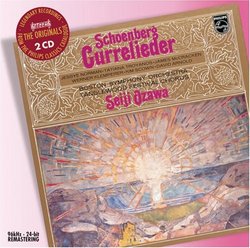| All Artists: David Arnold, Arnold Schoenberg, Seiji Ozawa, Tatiana Troyanos, Boston Symphony Orchestra, Jessye Norman, James McCracken, Kim Scown Title: Schoenberg: Gurrelieder Members Wishing: 1 Total Copies: 0 Label: Philips Original Release Date: 1/1/1979 Re-Release Date: 11/14/2006 Album Type: Original recording remastered Genre: Classical Style: Opera & Classical Vocal Number of Discs: 2 SwapaCD Credits: 2 UPC: 028947577829 |
Search - David Arnold, Arnold Schoenberg, Seiji Ozawa :: Schoenberg: Gurrelieder
 | David Arnold, Arnold Schoenberg, Seiji Ozawa Schoenberg: Gurrelieder Genre: Classical
|
Larger Image |
CD Details |
CD ReviewsAn outstanding performance L. Johan Mod�e | Earth | 05/20/2007 (5 out of 5 stars) "Seiji Ozawa's 1979 studio recording of Arnold Schönberg's Gurrelieder has been the prime recommendation since it first appeared in the LP format. Now it has been released in a new remastered incarnation, and the sound is simply superb.
The important question is, however, its status in the current catalogue. Among the recent recordings, we have Chailly's (Decca) and Rattle's (EMI, patched live). And then we have some other classic recordings, such as Ferencsik's (EMI, live), Kegel (Berlin Classics) and Kubelik (DG, live). Even if I wouldn't like to be without the three latter recordings and Chailly's, I think Ozawa's recording must be seen as the first choice - given that you can't afford the Kubelik set. First, the interpretation is first rate, as is the case with Kubelik's too, and with Kegel's as well. On the other hand, however, Kubelik's recording has the frisson of a live performance. Second, Ozawa's soloists are very fine - especially Troyanos and Norman shine like the stars they are. Kim Scown's Klaus-Narr is excellent, and Werner Klemperer's Spechgesang is almost second to none - save Julius Patzak's for Ferencsik and Hans Hotter's for Chailly. Of course, Ferencsik has Janet Baker and Kubelik has Inge Borkh as Waldtaube, but Troyanos' dove is as good as these. Ozawa's David Arnold is also excellent as Bauer. Further, Jessye Norman's Tove is without any rival on disc, even if Eva-Maria Bundschuh on the Kegel recording is nothing but great. Finally, James McCracken's performance of Waldemar is among the most memorable I have heard, outshining both Siegfried Jerusalem for Chailly and Alexander Young for Ferencsik. But, still, I hold Kubelik's Herbert Schachtschneider to the the best of all. Furthermore, Boston Symphony Orchestra is the great star on this recording, apparently in top form. Tanglewood Festival Chorus is very fine too. And every note is captured in excellent analogue stereo sound - actually more natural-sounding than the digital sound in both Rattle's and Chailly's recordings. However, the sound that DG achieved on Kubelik's seminal recording is slightly better, with a greater dynamic range. But a small drawback in Ozawa's recording is that there are clearly audible coughs, especially in part 1. This is because it is a live performance, and probably not patched. I have heard worse cases of coughers, however. A second drawback is that there is no fill-up on this remastered edition. The former Phillips edition had the two chamber symphonies as fill-up, but Inbal's performances of these works are not among the best. So this second drawback is also a minor complaint. My preference order is consequently: 1. Kubelik, 2. Ozawa, 3. Chailly, 4. Kegel, and 5. Ferencsik. What about Rattle, then? Well, save your money. The five Gurrelieders in my preference list are the ones to have, and Rattle's interpretation is quite dull. But if you only want one recording, Ferencsik's orchestra is not the very best, and the recording is less successful as well. And Kubelik's fine performance is currently only available as part of the - in the US - quite expensive Kubelik "Rare recordings" box. Kegel's fine recording is a possible alternative, but his soloists cannot really match Ozawa's. Chailly, finally, is marred by Jerusalem's voice, which doesn't fit in the present context - even if Chailly's interpretation is excellent and the sound is very fine. Thus, all things considered, Ozawa's Gurrelieder is the one to have - if you can't afford the Kubelik set. Warmly recommended. " |

 Track Listings (11) - Disc #1
Track Listings (11) - Disc #1